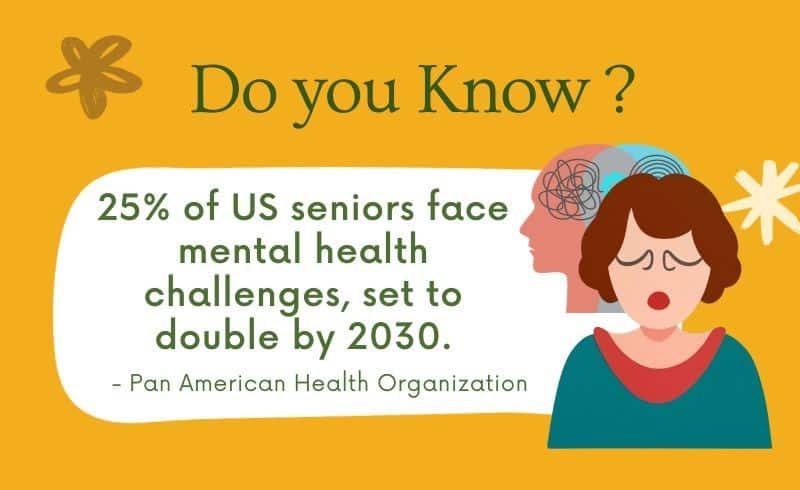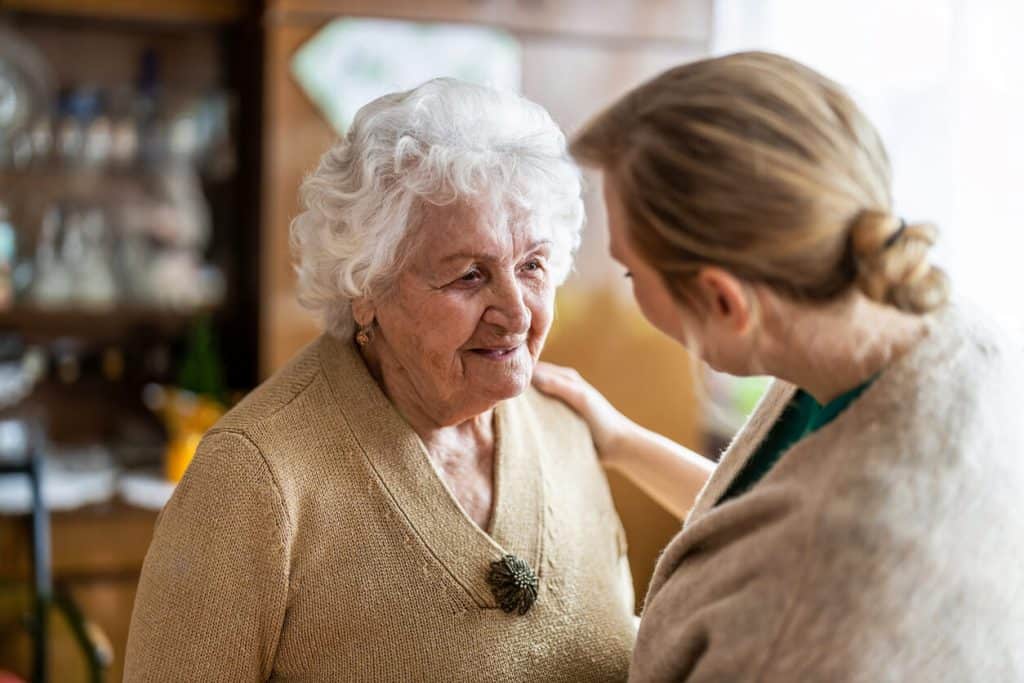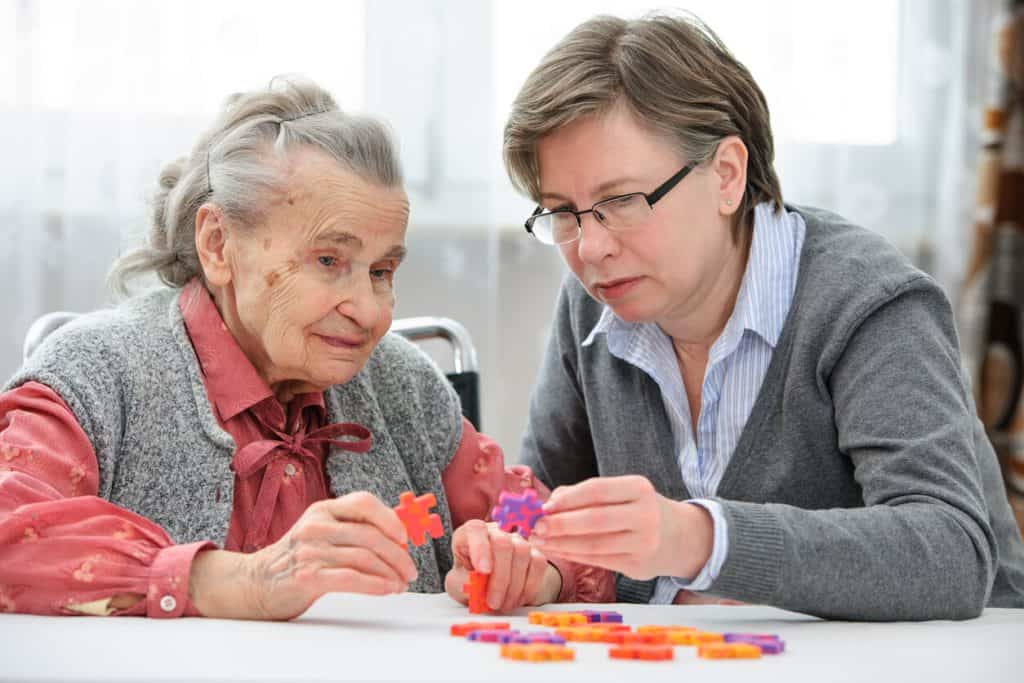
Mental health challenges are common in the US among all groups over the age of eighteen, both men and women. Unfortunately, our senior citizens also suffer mental health challenges. About 25% of all seniors suffer from some sort of mental health challenge making it more difficult to find compassionate assisted living homes. There are various contributing factors that exacerbate the situation for seniors:
- Loneliness
- Isolation
- Disrupted social and familial ties
- Age related health conditions that lead to depression
- Dementia and Alzheimer’s
- Lack of proper diagnosis/treatment
- Anxiety disorders
If your loved one struggles with any of these conditions, then it’s important to select an assisted living home that provides a safe, secure, and supportive environment.

Memory Loss and Memory Care Among Seniors
One of the most difficult challenges while caring for your loved one is when they show signs of dementia. Memory loss alone doesn’t necessarily mean they have dementia or Alzheimer’s. It’s important to get a proper diagnosis from their Primary Care Physician who may refer them to a specialist because there are various causes of memory loss.
Dementia is an umbrella term that covers multiple types of diseases which can cause progressive memory loss. Among those, Alzheimer’s is the most common cause of memory loss among our aging population.
If your loved one is exhibiting cognitive or psychological changes, then it’s important to seek medical attention. There are some medications that can slow the progression of certain types of memory loss and other medications that can help ease the psychological effects of dementia.
According to the Mayo Clinic, dementia affects more than memory; it affects one’s ability to think clearly and it also affects their social skills. Forgetting is a common complaint of many people have as they age, but that isn’t the only sign that something is wrong. If you suspect a family member of having dementia or Alzheimer’s, the following list might help you determine when to seek help:
- Memory loss that is severe enough that other people notice it too
- Having trouble finding the right word
- Getting lost more often, even in familiar locations
- Trouble solving simple problems
- Inability to make plans
- Struggling with organization
- Coordination and balance issues
- Increased confusion or being easily disoriented
Dementia can cause behavioral changes. Don’t be surprised if your loved one begins to say or do things that are uncharacteristic. For example, your sweet grandmother might use swear words that you didn’t even think she knew. Since this is a new behavior, thisisn’t a reflection of her true character, it is simply the disease.
Other examples of personality changes might include paranoia or anxiety. Even if your loved one has never had these tendencies, dementia can cause dramatic alterations in mental health because the cells of the brain have been damaged. Here’s a checklist of things to watch for when caring for your family member:
- Changes in their personality
- Depression or anxiousness
- Inappropriate behaviors
- Getting agitated easily
- Hallucinating
If your loved one is diagnosed with any form of dementia, including Alzheimer’s, there will be many lifestyle changes necessary to keep them safe, healthy, and happy. Caring for a loved one with mental health illnesses, like Alzheimer’s and dementia, can be tedious and sometimes feel overwhelming. There are some steps that you can take to help ease the burden and bring peace of mind.

First, prepare yourself and other friends and family to help take turns caring for your loved one. This is a work of love, but that doesn’t mean it will be easy. Arm yourself with knowledge about the specific diagnosis and disease your loved one is facing. Prepare their living space for safety to help prevent falls and accidents.
It’s essential that if you hire someone to help care for your loved one, that they have training in fall prevention and medication reminders or management. Individuals with dementia might skip their medication and are more susceptible to falls and injuries. Prevention is always better than facing a crisis.
Second, because Alzheimer’s and other forms of mental health challenges continue to progress as your loved one ages, consider alternative sources of housing. The very best facility will have very few residents.
Some memory care facilities are overwhelmed with patients and understaffed. As you will learn, seniors with dementia require one-on-one attention on a daily basis. Find a place where this is possible. Too many people, too much noise, or too much activity is overwhelming for people with dementia and causes agitation and anxiety.
Finally, because Alzheimer’s and other age related mental health illnesses disrupt the activities of daily living (ADL), your loved one will need increasingly more help with these. Dressing, bathing, personal grooming, laundry, food preparation, and medication management are just a few of the ADLs to consider.
The US Department of Health and Human Services has valuable information specifically about Alzheimer’s care. Here are some of the tips they share with families caring for loved ones with various forms of dementia:
- Routines are important, so bathe, dress, and eat at the same time every day.
- Keep lists of important dates and appointments, there may come a point in which your loved one will no longer be able to read or understand them but might still ask for them. It’s best to provide it for them instead of arguing about whether or not they need it or can understand it.
- Provide activities that they still enjoy and can do. It might simply be watching a re-run of their favorite show.
- Help manage and remind them of their medications. There will come a point when they will not be safe even taking a simple pain reliever without supervision.
- Be patient when they are getting dressed or taking a shower. Let them do as much of it themselves as possible. It might take longer, but it helps them maintain a sense of independence. Be patient, but intervene before they get frustrated with the task.
- Be patient when they eat, they need more time. It might also be helpful to avoid foods that are hard to manage, pre-cut meats and other foods into small bite-sized pieces.
- Provide clothes that are easier to get off and on. Trade buttons and zippers for elastic. Look for shoes that either slip on or have Velcro instead of laces.
- Prepare the bathroom with plenty of grab bars, a shower chair, and a platform toilet seat.
- Most of all, be kind. Be respectful. Explain as you go so they better understand what is going on. You might have to explain the same thing many times. Be patient and compassionate. Be patient with yourself too.
Sundowners or Sundowning Syndrome
One of the more difficult parts of caring for an elderly loved one with mental health challenges is when, after a long day, they exhibit signs of Sundowning Syndrome. This syndrome isn’t a disease, but rather a condition that occurs in the late afternoons or early evenings. Unfortunately, it can last for many hours until they finally fall asleep from exhaustion.
The symptoms include confusion and general anxiety, among other things. Seniors with dementia and sundowners can become aggressive or completely ignore the caregiver when this happens. Another symptom is restlessness, which might manifest itself as fidgeting if your senior is confined to bed or a wheelchair. If your loved one is mobile and becomes restless when they have sundowning, then you might need to take extra precautions because this is a time when they can wander and get lost or injured.

Since we don’t know the exact cause of sundowners, there isn’t a sure way to prevent it. However, there are some things that seem to aggravate the condition:
- Spending the day in a new spot
- Over exertion or general fatigue
- Not enough light
- Hunger or thirst
- Undiagnosed urinary tract infection
- Pain which your loved one may not be able to express
- Boredom and depression
The Mayo Clinic recommends keeping a routine, limiting caffeine and sugar, turning on lights and playing relaxing background music. It’s important to turn on the lights during the day and turn the lights off or down during the night.They also recommend seeking help from a health care provider to rule out any underlying conditions that might be contributing to your loved one’s sundowning syndrome.
Because Alzheimer’s is prevalent and much more difficult for caregivers when coupled with sundowners, it’s a good idea to know what resources are available. Here is the Alzheimer’s Helpline, it’s available 24/7: 1.800.272.3900

Finding an Assisted Living Facility that Includes Memory Care
One of the most difficult decisions a family must make is how to best take care of an aging loved one with special memory needs. Because dementia and Alzheimer’s rob their victims of their memory and cognitive thinking skills, it becomes imperative for family and friends to take over decision making for them. That means that finding the most suitable assisted living home is crucial for their well-being.
Most facilities designed for memory care residents are very institutional. For example, nursing homes often have a separate secured wing dedicated to individuals with Alzheimer’s and dementia. Overworked and understaffed, patients who need one-on-one attention rarely have their needs fully met.
Amy’s Eden assisted living homes are designed to manage and care for your loved ones, with or without mental health challenges. The beautiful part is how they compassionately cater to their changing needs. If your family member enters an Amy’s Eden home, they will not automatically be evicted for an Alzheimer’s or dementia diagnosis. Instead, your loved one will receive the increased care, protection, and attention they will need even though they may seek professional medical and psychological appropriate help as needed
The Importance of Environment
A calm and stable environment is absolutely necessary for any senior with dementia or Alzheimer’s. Change and overstimulation cause adverse effects in people with this type of disease. Too much noise, too much activity, and too many people agitate people suffering from Alzheimer’s and dementia. And in large facilities, too many others with the exact same condition. They can’t process everything that’s going on, so they become easily upset.
Your loved one will require a steady routine, trained caregivers who are patient and compassionate, and as much continuity as possible. Amy’s Eden, unlike other facilities, will strive to keep your loved one in the same assisted care home for life.
Your loved one will benefit from their expertise. Quality of life is a treasure that needs to be maintained through the right connections and experiences. Amy’s Eden caregivers understand that when your loved one has dementia or Alzheimer’s that their behavior is never a negative reflection of their personality.
They are trained to interpret behaviors as a way to understand what your senior loved one is trying to communicate. Agitation, anxiousness, anger are a way of letting them know that they need something. These compassionate caregivers will determine if your loved one is simply hungry, soiled, confused, afraid, or in pain.
Visit the Amy’s Eden website for assistance. You can call or visit them to get more information about what we offer, it’s free to find out. Their staff can provide the support and resources you need as you explore everything from community programs and menus to treatments and accessibility for your adult loved one with mental health issues. Whether you are seeking residential living that will help your senior stay independent or if you are looking for more support and assistance for a senior with a disability, explore your options and contact Amy’s Eden by visiting their web site today.
You can enjoy more peace of mind knowing that your loved one is being cared for by people who work hard to build a kind, trusting relationship with them.





